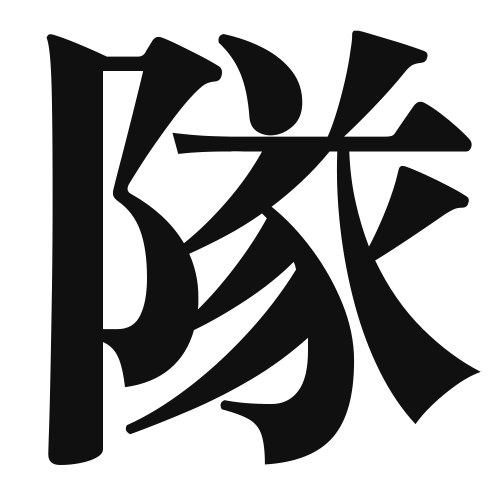1. Overview of Meaning
The kanji “隊” (tai) generally means “squad,” “group,” or “team.” It is often used to refer to a group of people organized for a specific purpose, such as a military unit or a sports team.
2. Formation and Radical
Formation of the Kanji: The kanji “隊” is a compound character, which means it is formed by combining different elements. It consists of the radical “阝” (which often relates to hills or mounds) and the character “隊,” which can be interpreted as a phonetic component. This character is classified as a compound ideograph (会意文字), as it conveys a meaning through the combination of its parts.
Radical: The radical of “隊” is “阝,” which is associated with geographical features, indicating that the term may have originally had a connection to groups formed in specific locations.
3. Examples of Usage
Common Words and Phrases: Some frequently used words that include “隊” are:
- 警察隊 (keisatsutai) – police squad
- 消防隊 (shouboutai) – fire brigade
- 軍隊 (guntai) – military forces
Example Sentences in Daily Conversation:
- 彼は消防隊の一員です。 (Kare wa shouboutai no ichiin desu.) – He is a member of the fire brigade.
- 私たちはサッカーチームの隊です。 (Watashitachi wa sakka chīmu no tai desu.) – We are a team of the soccer club.
4. Synonyms and Antonyms
Similar Kanji: A similar kanji is “団” (dan), which also means “group” or “association.” However, “団” often implies a more formal or organized group, while “隊” tends to refer to a team or unit with a specific function.
Antonyms: An antonym for “隊” could be “個” (ko), which means “individual” or “single,” emphasizing the concept of being alone rather than part of a group.
5. Cultural and Historical Background
Relation to Japanese Culture: The concept of “隊” is significant in Japanese culture, especially in contexts like martial arts, sports, and community organizations. Teams and groups are often emphasized in Japanese society, reflecting the value placed on cooperation and collective effort.
Proverbs and Idioms: One relevant proverb is “一人は皆のために、皆は一人のために” (Hitori wa mina no tame ni, mina wa hitori no tame ni), which translates to “One for all, and all for one,” highlighting the importance of teamwork and unity.
